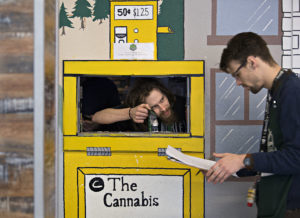‘Fear and uncertainty’ for Clark County marijuana industry

Newly announced plans to tighten enforcement of federal marijuana laws have jolted the recreational marijuana industry, which has flourished in recent years but never seemed complacent.
U.S. Attorney General Jeff Sessions announced Thursday he would rescind policies put in place during the Obama Administration that told federal law enforcement officials to back off from marijuana industries in states where it is legal.
Sessions said he would let prosecutors decide for themselves how aggressively to enforce federal laws, which have prohibited marijuana use and sale for years.
Ramsey Hamide, whose downtown Vancouver store Main Street Marijuana is the busiest in the state, said he woke up to 10 messages on his phone after Sessions’ “unsettling” announcement.
“I think there is a lot of fear and uncertainty in the industry,” the 39-year-old said.
Washington is one of eight states where marijuana is legal for recreational sale and use, following the passage of Initiative 502 in November 2012. The law taxes sales and opened a marketplace regulating how marijuana is grown, processed, wholesaled and ultimately sold to consumers.
The top five counties to date — King, Spokane, Pierce, Snohomish and Clark counties — have generated more than $480 million in tax revenue, according to data from the industry tracking site 502data.com.
Clark County retailers have collectively sold more than $150 million of marijuana products through June 30, 2017, according to the state Liquor and Cannabis Board.
A report from the Washington State Institute for Public Policy found that, from 2014 to 2016, licensed marijuana businesses employed about 6,000 full-time workers who earned about $286.1 million in wages.
Jim Mullen, owner of The Herbery stores in Vancouver and president of the Washington CannaBusiness Association, said they aren’t deterred.
“I’m telling my staff we’re going to be calm, take this one day at a time,” he said.
‘We welcome the scrutiny’
Those who work in the local cannabis industries say things will proceed business as usual, which is to say busy, but carefully.
Hamide, who opened Main Street Marijuana with his brother in July 2014, said they are particularly unsettled not only because they are the biggest in the state but because they are near the Oregon-Washington border. Federal laws are strict about marijuana crossing state lines.
“Just when you look at a list and you’re one of the highest people on that list, where are the eyes going to gravitate?” he said.
Main Street Marijuana’s busiest location, near the intersection of 23rd Avenue and Main Street, is the busiest in the state. Last year it generated $14 million through October.
How any enforcement would work is still unclear and would impact many in the area. Clark County has 24 growers and 13 retailers, according to the latest data. Main Street Marijuana alone has three locations with 105 full-time employees.
State regulations also allow retailers to stay stocked with 90 days worth of product, Hamide said.
“What are we going to do, we’re going to lay off 100 employees? We’re going to stop selling product?” Hamide said. “Even if there is a shutdown, we’re going to have to have a period of unwind. I don’t think there’s going to be imminent action.”
One high-volume grower in Clark County who wished to remain anonymous said any enforcement would go back to the black market, which he said remains sizeable.
“If the drug rules Sessions wants to enforce were working, there wouldn’t be such a large market,” he said. “The tax revenue is going back to the drug cartel and it’s going back under the table.”
Brian Lade, whose Arlington-based company Smokey Point Productions produces close to 800 pounds of marijuana flower and 500 pounds of oil every month, said they are used to this kind of pressure.
“We’re really kind of used to being under the microscope at this point. I deal with the liquor board regularly, we’re audited regularly, all of our financial data is public information,” he said. “Not to mention there’s two video cameras on me any time I’m in the facility. We welcome the scrutiny.”
Clark County marijuana sales
Sales are tracked July 1 to June 30
2015: $27,007,613.27
2016: $52,538,742.26
2017: $71,082,788.47
Source: State Liquor & Cannabis Board
